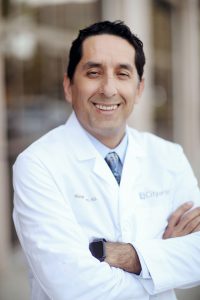
By Misagh Karimi, M.D., City of Hope Orange County
It’s more important than ever to prioritize your health and wellness. Making and keeping these healthy lifestyle resolutions can play a role in reducing the overall risk of certain cancers and start your year off right.
Schedule Your Screenings.
Getting your preventive cancer screenings is one of the most important ways you can reduce the chances of getting certain kinds of cancer, including, lung, breast, prostate, and colorectal cancers. Screening guidelines often change; ask your doctor which ones you need based on your age and family history.
Make Every Bite Count
Research suggests that diet-related factors play a role in around 30 percent of cancers. Many of us start the year by resolving to set a healthier dinner table, but what about our snacks? Instead of grabbing protein bars or pretzels, opt for a serving of almonds or seeds, or an apple with peanut butter. To get in the habit of smart snacking, start by replacing one processed snack per day with a healthier option, and don’t purchase new temptations when the old ones are gone. Make the good stuff easy to grab.
Get Physical
Pledging to exercise more might be the most common New Year’s resolution people make. Preventing cancer is one of the best reasons to follow through on it. Regular physical activity and good nutrition combine to help you maintain a healthy weight, which is an important factor in reducing the risk of at least nine cancers that are related to being overweight or obese. If you struggle with getting exercise, ask your doctor to connect you with resources to help keep you active.
Avoid Alcohol
Excessive alcohol use is linked to increased risk of several cancers and can cause a host of other health issues. If you choose to drink alcohol, do so in moderation. The USDA’s dietary guidelines define moderate drinking as no more than one drink per day for men and no more than one drink per day for women on days when alcohol is consumed. If you’re receiving cancer treatment, ask your doctor whether it is safe for you to consume alcohol at all.
Say “So Long” to Smoking
Smoking is the number one risk factor for lung cancer and contributes to cancers in other parts of the body. It has a role in up to 90 percent of U.S. lung cancer deaths. If you are a smoker, quitting can greatly reduce your risk of developing lung cancer; if you are a cancer patient, quitting will make your treatments more effective. Talk to your doctor about tobacco cessation and lung cancer screening — the sooner, the better.
Misagh Karimi, M.D., is the director of clinical operations at City of Hope Newport Beach Fashion Island and a medical oncologist specializing in gastrointestinal cancers. For more information on City of Hope locations in Newport Beach (Fashion Island and Lido) and the surrounding area, visit https://www.cityofhope.org/orange-county/city-of-hope-orange-county.




